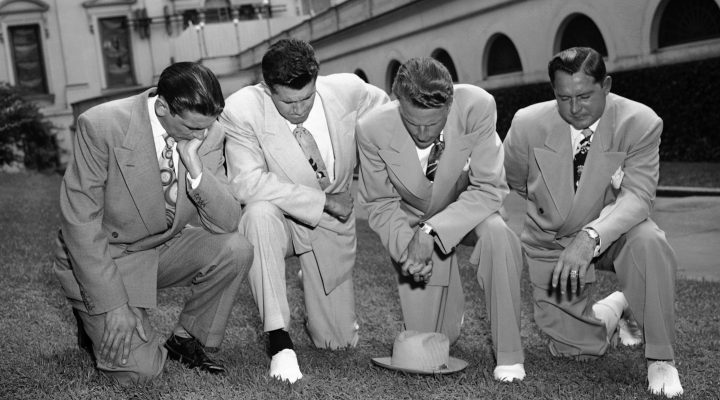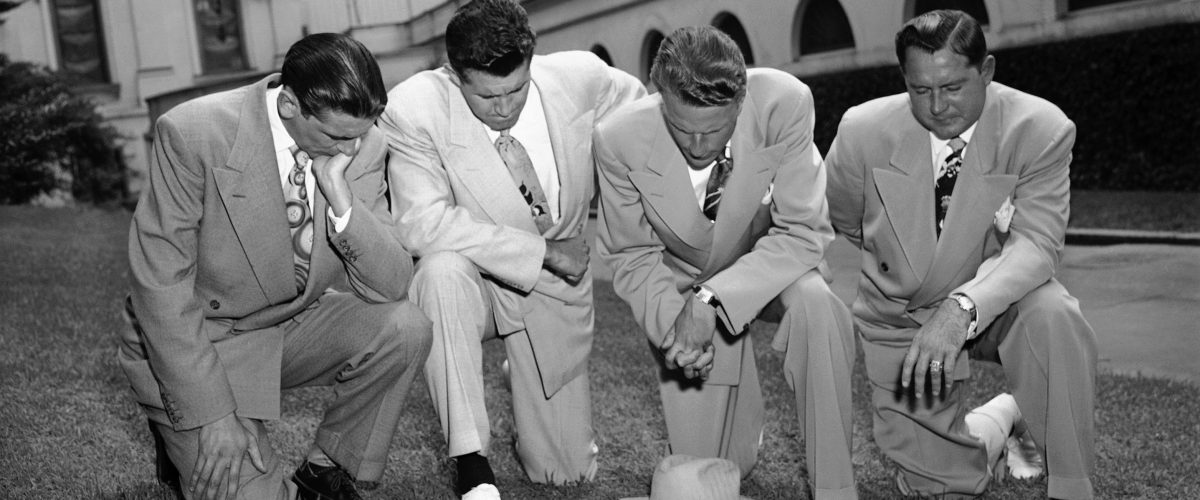Autumn offers a string of Friday Night Lights at high school football. And this autumn marks the first time coaches can feel free to “take a knee” on the 50-yard line to pray at the end of a game.
The Supreme Court said so on June 17, 6-3. And that settles it!
Or does it? Will it only be a matter of time until some coach — they do tend to get emotional — rushes onto the field to take a knee and pray after his team comes from behind to tie the game and prepares to go for the extra point with four seconds remaining in the fourth quarter? Or a coach sprints out to the 50 after his quarterback throws an impossible “Hail Mary” pass that is caught for a decisive touchdown.
Prayer in public settings — verbal, out-loud prayer as well as prayer for the cameras — has been a contention for decades. One famous evangelist learned taking a knee for the wrong reason has consequences. That evangelist opened his autobiography, Just as I Am: “I was getting ready to make a fool of myself.”
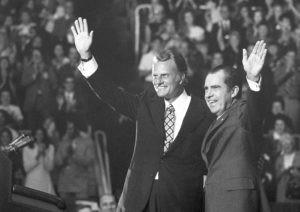
Evangelist Billy Graham and President Nixon wave to a crowd of 12,500 at ceremonies honoring Graham at Charlotte, N.C., on Friday, Oct. 16, 1971. (AP Photo)
Here’s the story. Billy Graham had just had his first Oval Office visit with a president, Harry S. Truman, a Missouri Baptist. Graham would go on to collect politicians the way kids of that era collected baseball cards.
A myth persists that Graham “counseled” every president since Harry Truman. Stephen Strang, in God and Donald Trump, stated that Graham, “was asked to meet with and pray for every U.S. president since World War II, from Truman to Obama.” In fact, Graham was not “asked” to meet with or pray for Harry Truman. He got himself invited. The historian Randall Balmer reported that Graham had “agitated to get an audience” with the president.
Graham had his appointment on July 14, 1950, three weeks after war had broken out in Korea, an event Graham thought apocalyptic and Truman wanted to keep from becoming apocalyptic, given the possibility of the Chinese communists entering the war to support North Korea.
As Graham and his associates Grady Wilson, G.F. Beavan and Cliff Burrows emerged from the 25-minute meeting, reporters and photographers, Graham recalled, “pounced on us” demanding, “What did he say? What did he say?”Graham began telling them “everything he could remember.”
A reporter asked, “Did you pray with him?” Graham replied, “Of course, we prayed with the president.” That got the photographers’ attention. “Could you demonstrate that prayer for us?”
So, like a football coach in Washington, Graham and associates took the knee onto the grass. While Graham did not repeat the exact words of his prayer for the president, he rationalized, “We had been planning to thank God for our visit anyway, and now was as good a time as any.”
The quartet, attired in colorful pastel summer suits, hand-painted ties and wearing white buck shoes, sent photographers into a frenzy. Graham led the prayer of thanksgiving “impervious to the popping flashbulbs and scribbling pencils.”
“Graham led the prayer of thanksgiving ‘impervious to the popping flashbulbs and scribbling pencils.’”
They may have had an informal debriefing after their experience over burgers and fries. Clearly, they had no anxiety about the visit or the photo op. A picture would look good framed on the wall or be useful in promotional pieces. Graham immediately penned a thank you note to Truman and requested an autographed photo.
The next morning, the Washington Post ran the photo, above the fold, front page — prime spot. When the newspaper landed on the president’s desk Truman went ballistic, Baptist ballistic. Soon administration insiders were leaking to syndicated columnists that for blabbing the details of a private conversation with the president and “that photo” the young evangelist was persona non grata at the White House. Moreover, the president would not be attending Graham’s crusade in the Washington Armory — no matter how many Democratic senators and representatives were ushering and posing for photos for the press. (Truman thought several should have headed to the front on the first verse of “Just as I Am.”)
Truman concluded that the young evangelist was a self-promoter and Truman pronounced him “a fakir,” particularly after Graham began assailing, in sermons, Truman’s policies on the conduct of the war in Korea. “Did you vote for this war? I didn’t!” Graham thundered in one sermon. And Graham began sermonically insinuating that Truman had been responsible for the fall of “Christian” China to Mao and his communists one year earlier.
In his autobiography, he conceded that the exchange with the media had been “a terrible mistake on my part.” He wrote: “National coverage of our visit was definitely not to our advantage.” Graham soon learned how to finesse Oval Office visits, as well as golfing outings with future presidents and vice presidents.
“When Graham had asked the president about ‘his walk with the Lord,’ Truman had answered, ‘I try to live by the Sermon on the Mount and the Golden Rule.’”
When Graham had asked the president about “his walk with the Lord,” Truman had answered, “I try to live by the Sermon on the Mount and the Golden Rule.” Truman’s try was not punctuated with a wink, nervous chuckle or grin. “Try” reflected his faith. Hundreds of times he had read Jesus’ Sermon on the Mount and had prayed the Lord’s Prayer — “forgive us our trespasses as we forgive those who trespass against us.”
“Try” was not part of Billy Graham’s lexicon. Rather, to be born again meant having confessed sins and invited Jesus into your heart. Many evangelicals had concluded that Truman had numerous sins to confess: cussing, lack of regular church attendance, fondness for bourbon, playing poker and his call for a “Fair Deal” for all Americans and civil rights, socialism writ large to some. Many fundamentalists and Graham donors believed the president was setting “a “poor example” for the nation’s youth.
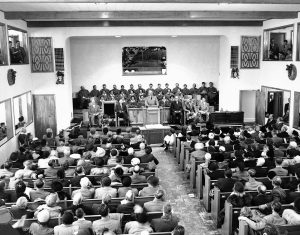
President Harry S. Truman speaks from the pulpit of the Grandview, Mo., Baptist Church of which he is a member as he dedicates the new $102,000 structure, Dec. 24, 1950. More than 400 persons filled the auditorium for the ceremony. The Truman family has been affiliated with the Grandview church for nearly 100 years. (AP Photo/William J. Smith)
What has Truman’s “trying to live by the Sermon on the Mount” got to do with the football coach in Washington who dropped to the knee for photographers on the 50-yard-line and again on the marble steps of the U.S. Supreme Court minutes before his appeal was heard by the court?
At an October 1949 press conference, after a reporter asked, “Do you agree with the Sermon on the Mount?” President Truman had responded, “I do. I am in complete agreement with it.” That set off a buzz because many reporters were unfamiliar with this “sermon on the mount.” Truman urged the reporters to read the fifth, sixth and seventh chapters of the Book of Matthew, which he believed would “do them good.”
In 1959, Truman delivered the morning message at Elmwood Methodist Church in Dallas and urged the congregation to “read the whole thing again — then, read it again — then, read it again. It won’t harm you to read it a hundred times, because the more you read it, the more of it will stick in your head.”
I am currently writing a book about Harry Truman’s spirituality. Truman’s suggestion to “read it a hundred times” took on meaning after the Supreme Court ruled the Washington coach could pray at the 50-yard-line. I started Truman’s challenge to read the Sermon on the Mount 100 times, but I keep bogging down in chapter 6 when Jesus warned, “Be careful not to practice your righteousness in front of others to be seen by them.”
There’s a lot packed in “Be careful not to…” Admittedly, Jesus did not say do not practice your righteousness before football stadiums, because Jesus was unaware of football. On some days, reading the Sermon, on the Mount, I have fast-tracked past verse one only to smack into verse five, which resounds like brass and tympani: “And when you pray, do not be like the hypocrites, for they love to pray standing in the synagogues and on the street corners to be seen by others.”
For the disciples, who could be slow to fully grasp Jesus’ teaching, he added specific direction: “But when you pray, go into your room, close the door and pray to the Father, who is unseen. Then your Father, who sees what is done in secret, will reward you.” Why did Jesus say, “and on the street corners”? Might “street corners” be construed to mean 50-yard lines on football fields? How can anyone kneel at the 50-yard line postgame and not be seen by “others?”
“Football coaches might question a referee’s call, but who can question the clarity of Jesus’ words here?”
For evangelical football coaches and sports fans thinking about taking a knee some Friday night, I ask: Did Jesus actually say these words in the sixth chapter of Matthew? Yes or no? Do you believe the words in the Sermon on the Mount are Jesus’ words? Football coaches might question a referee’s call, but who can question the clarity of Jesus’ words here? The tired cliché comes to mind, “Jesus said it, I believe it, and that settles it.”
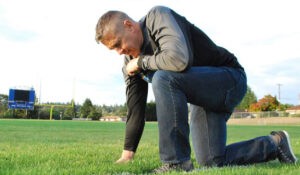
Joseph Kennedy in a photo provided by his law firm, First Liberty Institute.
On a recent Ezra Klein podcast, Russell Moore talked with interviewer Jane Coaston about biblically illiterate evangelicals — a reality demonstrated in Stephen Prothero’s research on spiritual literacy where a significant majority of individuals polled thought Billy Graham had preached the Sermon on the Mount.
Moore related the angst of a pastor who, in a recent sermon, had quoted Jesus’ own words directly from the Sermon on the Mount. After the service, an irritated man demanded, “Preacher, where did you get those ‘lib’ talking points in the sermon?” The pastor thought the man was teasing but the questioner’s facial expression and body language doused that notion.
“Why, they’re in the Sermon on the Mount. Those are Jesus’ words!”
The man snapped, “Well, those were for a different time than today.”
I know many evangelicals think cherry-picking Scripture is a spiritual gift. But Jesus’ words in Matthew 5-7 seem right close to clear when it comes to praying at football games.
Paul Putz of the Faith and Sports Institute at Baylor University’s Truett Seminary, when quizzed by Kelsey Dallas, a sportswriter, about the Supreme Court’s decision wisely advised:
I also hope the ruling leads to more reflection by Christians on our public prayers and how we pray when we’re in positions of influence. There’s a passage in the Bible that says don’t make a display of your prayer. If we’re taking the Bible seriously, what are the implications of that? What does it mean to have a meaningful prayer life as a Christian coach and bring your full self into public but do it in a way that’s faithful to Scripture and respects the religious viewpoints of everyone on your team? People can and will land in different places on that, but I hope there’s more reflection and humility about the life that Christians lead and how we can work together for the common good.
Six words in Putz’s response troubled me: “If we’re taking the Bible seriously.” Are we taking the Sermon on the Mount — Jesus’ words — seriously on Friday nights? Was Harry Truman right? Does it take a hundred readings of Matthew 6 for Jesus’ words to sink in?
Maybe this fall’s string of Friday nights under the lights is an invitation to read and to re-read the Sermon on the Mount and “try” to live it. Otherwise, somebody like those coaches — like Billy Graham — might live to regret their photo ops.
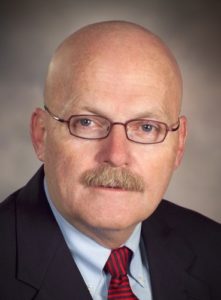
Harold Ivan Smith
Harold Ivan Smith is thanatologist and independent scholar. For 18 years he served on the teaching faculty of Saint Luke’s Hospital in Kansas City, Mo. He earned graduate degrees from Scarritt College, Vanderbilt University, and a doctor of ministry degree from Asbury Theological Seminary. His writings include A Decembered Grief, On Grieving the Death of a Father; Grieving the Death of a Mother; When You Don’t Know What to Say; When a Child You Know Is Grieving, When Your People Are Grieving: Leading in Times of Loss.
Related articles:
God, bless this football game to our blood lust’s nourishment | Opinion by Brad Bull
When it comes to leading corporate prayer, are we really all in this together? | Opinion by Mark Wingfield
Choosing the underdog | Opinion by Patrick Wilson

